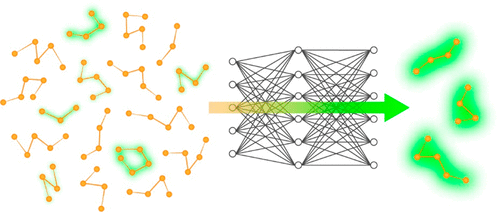当前位置:
X-MOL 学术
›
ACS Comb. Sci.
›
论文详情
Our official English website, www.x-mol.net, welcomes your feedback! (Note: you will need to create a separate account there.)
Comprehensive Prediction of Molecular Recognition in a Combinatorial Chemical Space Using Machine Learning.
ACS Combinatorial Science ( IF 3.903 ) Pub Date : 2020-07-27 , DOI: 10.1021/acscombsci.0c00003 Alexander T Taguchi 1 , James Boyd 2 , Chris W Diehnelt 3 , Joseph B Legutki 2 , Zhan-Gong Zhao 3 , Neal W Woodbury 3, 4
ACS Combinatorial Science ( IF 3.903 ) Pub Date : 2020-07-27 , DOI: 10.1021/acscombsci.0c00003 Alexander T Taguchi 1 , James Boyd 2 , Chris W Diehnelt 3 , Joseph B Legutki 2 , Zhan-Gong Zhao 3 , Neal W Woodbury 3, 4
Affiliation

|
In combinatorial chemical approaches, optimizing the composition and arrangement of building blocks toward a particular function has been done using a number of methods, including high throughput molecular screening, molecular evolution, and computational prescreening. Here, a different approach is considered that uses sparse measurements of library molecules as the input to a machine learning algorithm which generates a comprehensive, quantitative relationship between covalent molecular structure and function that can then be used to predict the function of any molecule in the possible combinatorial space. To test the feasibility of the approach, a defined combinatorial chemical space consisting of ∼1012 possible linear combinations of 16 different amino acids was used. The binding of a very sparse, but nearly random, sampling of this amino acid sequence space to 9 different protein targets is measured and used to generate a general relationship between peptide sequence and binding for each target. Surprisingly, measuring as little as a few hundred to a few thousand of the ∼1012 possible molecules provides sufficient training to be highly predictive of the binding of the remaining molecules in the combinatorial space. Furthermore, measuring only amino acid sequences that bind weakly to a target allows the accurate prediction of which sequences will bind 10–100 times more strongly. Thus, the molecular recognition information contained in a tiny fraction of molecules in this combinatorial space is sufficient to characterize any set of molecules randomly selected from the entire space, a fact that potentially has significant implications for the design of new chemical function using combinatorial chemical libraries.
中文翻译:

使用机器学习对组合化学空间中的分子识别进行综合预测。
在组合化学方法中,已使用多种方法针对特定功能优化构件的组成和排列,包括高通量分子筛选、分子进化和计算预筛选。在这里,考虑了一种不同的方法,它使用库分子的稀疏测量作为机器学习算法的输入,该算法在共价分子结构和功能之间生成全面的、定量的关系,然后可用于预测任何分子在可能的情况下的功能。组合空间。为了测试该方法的可行性,一个定义的组合化学空间由 ~ 10 12使用了 16 种不同氨基酸的可能线性组合。测量该氨基酸序列空间的非常稀疏但几乎随机的采样与 9 个不同蛋白质靶标的结合,并用于生成肽序列与每个靶标的结合之间的一般关系。令人惊讶的是,测量到 ∼10 12可能的分子提供了足够的训练来高度预测组合空间中剩余分子的结合。此外,仅测量与目标结合较弱的氨基酸序列可以准确预测哪些序列的结合强度会高 10-100 倍。因此,该组合空间中一小部分分子中包含的分子识别信息足以表征从整个空间中随机选择的任何一组分子,这一事实可能对使用组合化学库设计新的化学功能具有重要意义.
更新日期:2020-07-27
中文翻译:

使用机器学习对组合化学空间中的分子识别进行综合预测。
在组合化学方法中,已使用多种方法针对特定功能优化构件的组成和排列,包括高通量分子筛选、分子进化和计算预筛选。在这里,考虑了一种不同的方法,它使用库分子的稀疏测量作为机器学习算法的输入,该算法在共价分子结构和功能之间生成全面的、定量的关系,然后可用于预测任何分子在可能的情况下的功能。组合空间。为了测试该方法的可行性,一个定义的组合化学空间由 ~ 10 12使用了 16 种不同氨基酸的可能线性组合。测量该氨基酸序列空间的非常稀疏但几乎随机的采样与 9 个不同蛋白质靶标的结合,并用于生成肽序列与每个靶标的结合之间的一般关系。令人惊讶的是,测量到 ∼10 12可能的分子提供了足够的训练来高度预测组合空间中剩余分子的结合。此外,仅测量与目标结合较弱的氨基酸序列可以准确预测哪些序列的结合强度会高 10-100 倍。因此,该组合空间中一小部分分子中包含的分子识别信息足以表征从整个空间中随机选择的任何一组分子,这一事实可能对使用组合化学库设计新的化学功能具有重要意义.


























 京公网安备 11010802027423号
京公网安备 11010802027423号